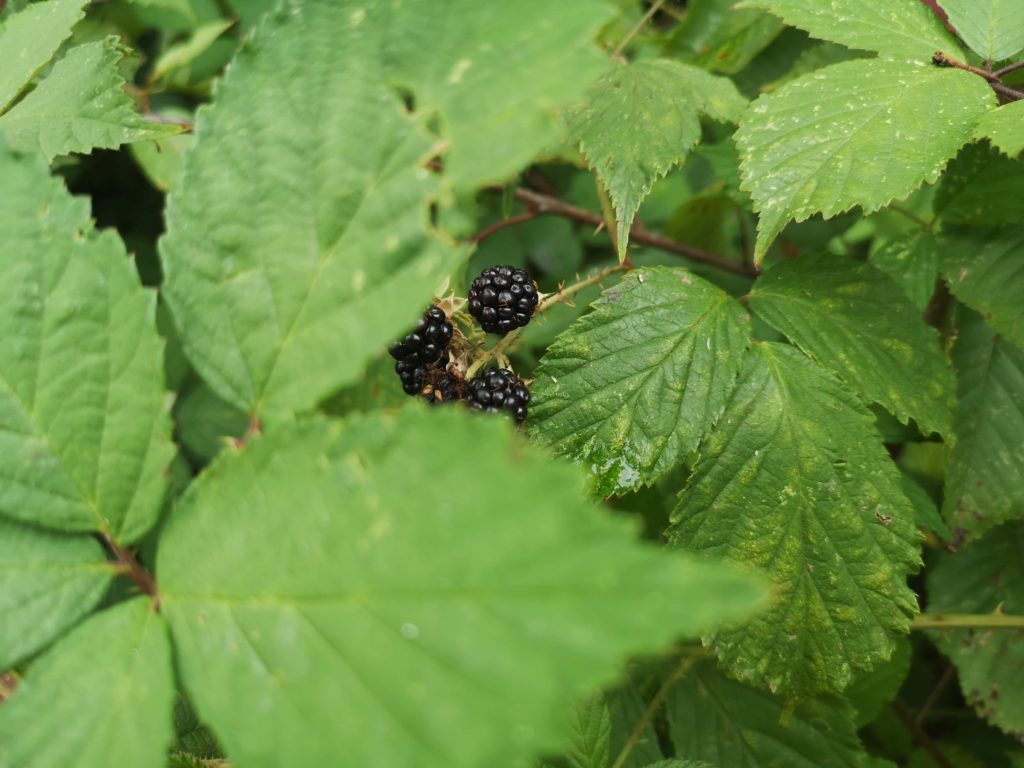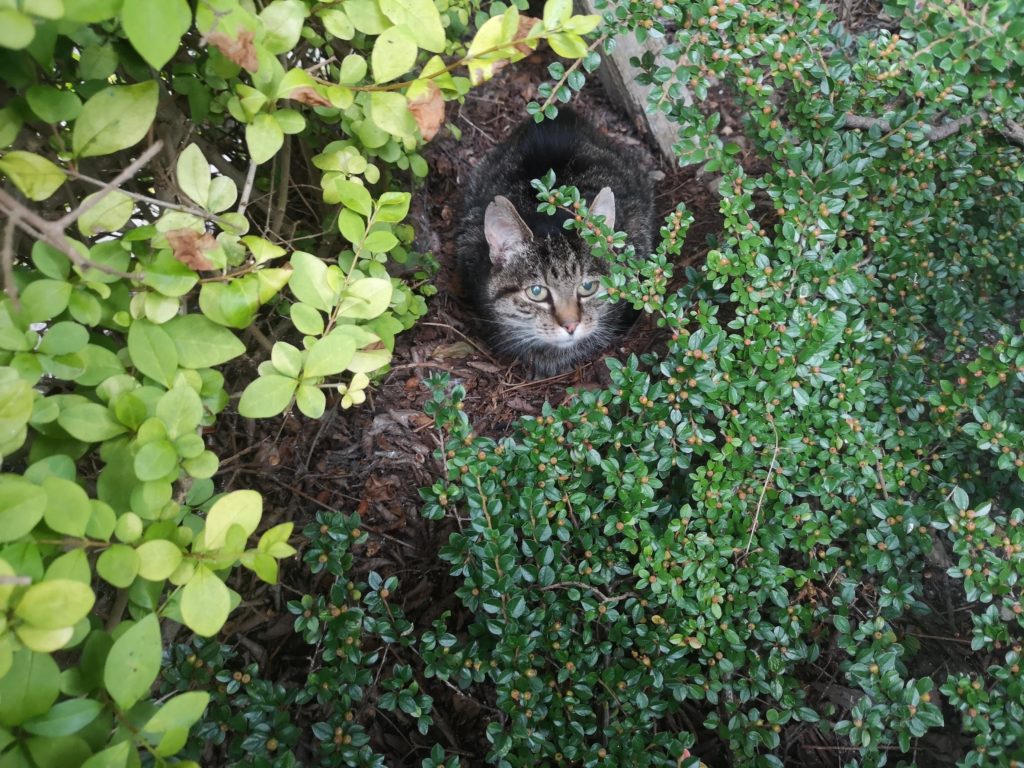Tamsin Grainger walks forageable and forbidden places near her home in Edinburgh.

“To seek for that, which hardest is to find.”
(Poems, and Fancies by Margaret Cavendish (1623-73)
The strip of nature opposite my house has a fence around it and no gate, so I must collect the old IKEA plastic stool from underneath the new plants in my back yard and use it to balance, rather precariously it must be said, and clamber over. For I have the Right to Roam here in Scotland, and I spy bounty for my bowl.
All manner of wildlife pad along the closely mowed grassy strip on the other side when they think we’re not watching. Seagulls and planes soar overhead, screeching and thrumming the air. There is a bench on the pavement, and the folk who sit there to gaze at the view often strew rubbish along the length of this hardly-a-lawn, despite the plastic bags I and my neighbour put out for the purpose. Thus, I first collect the detritus (I remembered my tough gardening gloves this time) and fill the bag. Then I drag it, vodka and beer dregs dripping through the hole in the bottom, leaving a gooey and not-so-fragrant trail, across the road to dismantle and sort for the recycling.
During the pandemic, the un-nameable grasses grew tall for the lack of Council mowing, and were visited by moths and butterflies I’d never seen there before. I did take photographs, but didn’t document as closely as I now wish I had; the officials deny it ever happened. Perhaps lots of us are doing that, preferring to rewrite the pandemic already, even though people are still dying of Covid.
I crouch with my Tupperware, braving the nettles which sting to remind me they’re there. I am gathering Brambles to go with the slightly withered apples on my sideboard, and, later, savour the pungent scent of their blackberry-stained and softened flesh, topped by dollops of yoghurt the colour of sparrow eggs. Once my pot is full and I have eaten my fill, I reverse the balancing act, half toppling back over the fence, and secrete my gifts behind the hedge where the moggy likes to hide and watch at the same time.
Now I’m up for some trespass!

I skirt the metal border, striding out unhindered. Down the hill between the small striped orange and white pyramids where they’re laying ‘Full Fibre Broadband’ and the decaying remains of the wildflower strip I go. I’m negotiating the roundabout traffic at Granton Square and contemplating the ivy which pushes aside the wooden slats, the oak roots which shove apart tarmac, and the roses overrunning the old toilet block, soon to produce their hips for syrup — delicious vitamin C for the winter.
Turning left, I fancy I spy a fox just sidling around the corner of the self-storage warehouse where a woman couldn’t fit. I imagine I see the tip of a rodent’s tail disappear under railings with no bother at all, and then a ferrety animal — low slung and beige with a tail — dashes across the road. I see it so clearly. On the phone the next day, Mum said maybe it was a stoat (she is used to finding a variety of small beasts on her kitchen floor of a morning, treats from the cat) but although it looked right in every other way it didn’t have a white tummy like the ones on the internet.
Off the main road now, I see that there’s a new Private Land sign gone up and security cameras on the opposite side, but I take my usual route. This harbour has a rich history. The Granton community used to work and play here every day when it was a-buzz with industry, and their voices can still be heard if you listen carefully. Along Chestnut Street and left onto Hesperus Crossway (both new names for old places) and before long, there’s a blockade.
Chunks of concrete bigger than me have been wedged in the way. I try squeezing myself sideways, then lie down in the dust and try crawling underneath, but it’s useless and I’m left clawing the diamond shaped holes of rusting metal helplessly, seeing the scarlet haws dangling, unreachable, along the paths where I used to go.
I see half a mongrel straining on a long lead, its front quarters under the buddleia, tail wagging very fast. At the other end of the taut thread, the arm of a woman in a red anorak is stretched right out; she’s walking slower and slower because she’s looking at her phone. I call out, asking her how she got through and she jumps slightly and extends the phone arm suddenly, frowning — it dawns on me that she thought my voice came from the mobile in her palm! I apologise for interrupting and repeat my question and she gestures vaguely behind me so that I twist round to look. Turning back to thank her, she’s engrossed once more.
I find the folded fencing, see that someone has used pliers on it — signs of citizen determination. I won’t be restricted either. Conjuring myself invisible and slipping through, I head for the scrubland and the precious elderberries. I look around as brazenly as I can, but no-one is in sight to witness my bravado, just the blank windows of the one tower block away in the distance. Clusters of shining ebony globes hang invitingly, willing me to make them into wine. I’ll leave plenty for the birds. Under my feet crawl herbs whose scent is released by the bruising, but I can tell that it’ll be a while before the sea buckthorn fruits are ready for plucking.
Climbing the small hillock as the first evening star appears, I look down the other slope to the place where we walked and painted ephemeral paintings with sea water last December. Like those images, it has all been erased; there’s nothing left except raw earth. Diggers are driving at funny angles, their single antenna waving in mid-air like ants carrying sticks that seem too big for them, tilting over a clod of soil. Faint music reaches me from their cabs and there’s shouting and waving going on. It takes a while to realise that it’s me the man’s hollering at and he looks dangerous somehow, hard hat shining in the floodlights which are towering above him.
My pockets and bag are full of spoils, I can smell the wet sweetness, but I’m tired of this game. I don’t want to get into an altercation. So I steal back through to the highway and make my way home through what used to be common ground that the Council have sold to the big companies to make money from. They’re reputed to be spending 5 million, so they must be sure they can make our land into their profits. They say they’ll provide ‘affordable housing’, but only 20-30 per cent, and the number of local amenities promised have already been slashed, though the berths in the marina-to-come have multiplied to nearly 450.
Homewards, and the anticipation of pans of sticky, bubbling juices. The vixen with the limp is watching me from the bushes, and car headlights are being switched off, engines quietened, before doors bang and lights go on inside. There’s a TV already broadcasting the news silently in the apartment above, and a man is filling a kettle before drawing the curtains across. The flat is shutting its eyes to what’s going on outside.
*
Tamsin Grainger is a writer, bodyworker and walking artist living in Edinburgh. She also holds online events, including Death Cafes and Guided Bodywalking. Visit her website here. Her Walking Without a Donkey project, chronicling her international long-distance walks, can be found here.